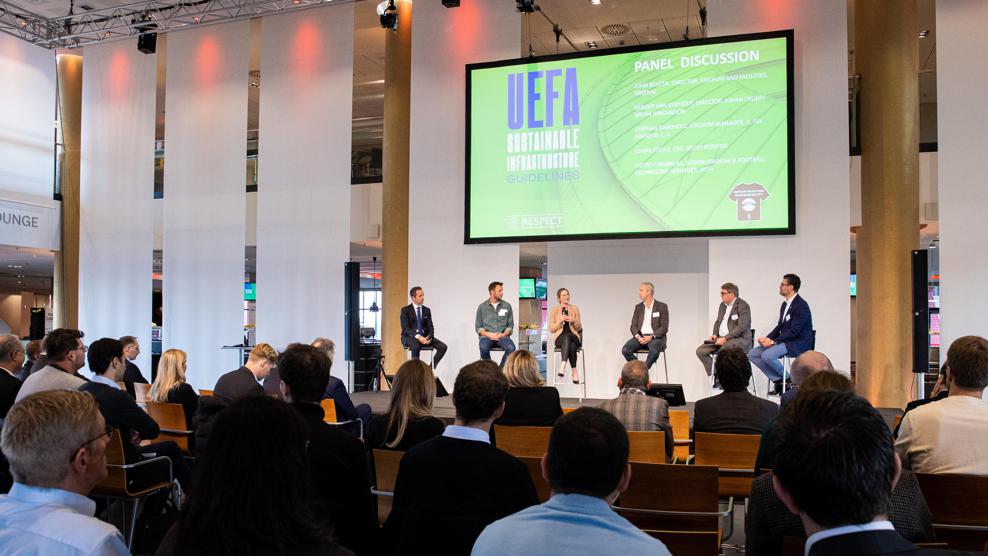UEFA launches Sustainable Infrastructure Guidelines
UEFA’s Sustainable Infrastructure Guidelines, unveiled today at a special event in Mainz, aim to raise the bar for European football venues.
UEFA has launched its new Sustainable Infrastructure Guidelines at a dedicated event at MEWA Arena in Mainz, Germany. The event featured panel discussions and experts’ presentations on sustainable football venues and facilities, encouraging knowledge transfer and sharing of best practices.
The document, which features forewords by UEFA president Aleksander Čeferin and European Commission executive vice-president Frans Timmermans, introduces the concept of infrastructure sustainability, structured around the topics of Environment Social and Governance (ESG). The guidelines cover key subjects such as purpose, location, design, conception and construction, pitch and landscaping. In addition, they provide insights into the infrastructure management phase, addressing for instance the use of embedded technology in stadium infrastructure and pitch quality, the management of event-related waste, and health and safety matters.
Infrastructure Sustainability is one of the eleven policies currently being deployed as part of UEFA’s Football Sustainability Strategy 2030, ‘Strength through Unity’. The policy’s ambition is to continue to raise the bar for European football infrastructure by setting criteria and sharing best practices for a new generation of sustainable football venues.
“The best preparation for tomorrow is doing our best today. These guidelines offer many innovative solutions and principles, whether you are planning to build new facilities or refurbish existing ones. If football comes together and bundles its power to drive sustainable change, it will have a powerful and long-lasting positive impact.”
Aleksander Čeferin, UEFA President
“The solutions showcased in these Sustainability Guidelines for Football Infrastructure are real game changers. Whether it’s construction, transport, waste or energy, it’s clear that smart design and operation of football stadia and sports facilities can make them true champions of climate action.”
Frans Timmermans, Executive Vice-President, European Commission
Embedding ESG practices in the football infrastructure lifecycle
Endorsed by the European Commission, the guidelines will help national associations, leagues, clubs, stadium and infrastructure managers, local authorities, and other football stakeholders to embed ESG practices and generate value across the three stages of the football infrastructure lifecycle by 2030:
“Today we kick off a wide-ranging effort to advocate for infrastructure sustainability across the European football ecosystem, including through translations across all UEFA languages and dedicated sessions with subject matter experts on environmental, social and governance criteria in the area of football infrastructure.”
Michele Uva, Football and Social Responsibility Director
“The football infrastructure of the future will increasingly link engineering, innovation and sustainability criteria. The guidelines showcase how this mix will provide long-term benefits to operators and strengthen the legacy of common spaces for local communities.”
Mark Fenwick, Partner Fenwick Iribarren Architects
The guidelines were developed with the support of experts externally (architects, clubs, national associations, operators, academics) and internally at UEFA (football and social responsibility division, football operations, national associations and EU office).
The document is designed to be an online working tool and will be updated on a regular basis (including its numerous case studies) with the latest trends around technology, legislation and stakeholder expectations.
A continuous support to national associations and clubs
UEFA will support national associations and clubs’ sustainability officers in the guidelines’ implementation through dedicated workshops and monitoring of the various activities. Numerous case studies and best practices are included in the guidelines and will be updated regularly, based on technological advancement, legislation, expectations from civil society and ever-evolving UEFA requirements.
Road to a sustainable UEFA EURO 2024
The meeting in Mainz was rounded off by looking ahead to UEFA EURO 2024, to be held in Germany. The ambition is for this event to be the most sustainable EURO ever and a driving force for sustainable development in German and European football.
The tournament is integrating sustainability dimensions in its tournament requirements and regulations, as well as in the match schedule, and will promote concrete and tangible actions in favour of the environment, social impact and good governance. At the same time, the event’s ten designated host cities will rely entirely on existing stadiums and facilities to stage their allocated matches.

Aris Limassol FC Social, Environmental, and Health Initiatives





